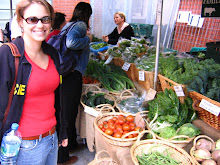 I have a serious amount of blogging to do, and I will catch up, but here’s a short update. I have a few weeks between leaving Minnesota and going to the Dominican Republic. In the interests of money and time, I decided against going back to Europe (turned down an opportunity to go to Terra Madre, agggggghhhh—what WAS I thinking?) and decided for staying in the United States and taking a tour of food sovereignty movements in my own backyard. There are a whole slew of urban gardens, sustainability initiatives and fabulous farms between Minnesota and Georgia, and I’m hitting as many as I can!
I have a serious amount of blogging to do, and I will catch up, but here’s a short update. I have a few weeks between leaving Minnesota and going to the Dominican Republic. In the interests of money and time, I decided against going back to Europe (turned down an opportunity to go to Terra Madre, agggggghhhh—what WAS I thinking?) and decided for staying in the United States and taking a tour of food sovereignty movements in my own backyard. There are a whole slew of urban gardens, sustainability initiatives and fabulous farms between Minnesota and Georgia, and I’m hitting as many as I can!Yesterday, I left Minneapolis (after a fabulous local breakfast at butter café) and drove to Milwaukee to visit some of the urban agriculture projects of which I have long been a fan. Colleague and friend, Nik Heynen, hooked me up with Walnut Way, which is a non-profit urban renewal project in a previously vibrant community, but until very recently a red lined, drug and prostitution haven on the border between two police districts. This neighborhood was a no man’s land until Sharon Adams came back to town and straightened a thing or two out.

The project started with community meetings to identify pressing needs. Among other things, there was a dire need for storm water runoff management. This is not the first time that I’ve heard of waste management as a pressing priority in poor, urban neighborhoods, but the global scope of this local need was really striking. The runoff of contaminated water affects this neighborhood, the regional watershed, the Great Lakes ecosystem, and ultimately the Atlantic Ocean. Sharon, and her partner Larry, researched the best way to do this, and among other things, including cisterns and rain barrels, started “rain gardens”.

Rain gardens are shallow wells built into the yards of the neighborhood residents that literally siphon rain water off roofs via downspouts, into small—virtually unnoticeable--wildflower gardens. A second need in the community was restoring the neighborhood continuity with housing in the community’s numerous vacant lots. The neighborhood, once a vibrant African-American community in Milwaukee’s jazz scene was redlined, disinvested and abandoned in the 1970s and 1980s. The detruction and removal of hundred year old houses left the community with a blighted landscape and no prospects for renewal. Except for a planned freeway through the heart of it, which was later abandoned. Thank god.

The city sold the vacant lots for a $1 to encourage building in the neighborhood. There are now home to peach trees, raspberry bushes and raised beds for vegetables. The majority of the produce is sold in the not for profit “Fondy Market” and the remainder is distributed throughout the community. The project has since expanded, with a very large grant by real estate tycoon Joe Zilber via the Zilber family foundation, to the Lindsay Heights neighborhood, to the north of Walnut Way.
 A few kids down the street, like kids all over the world, wanted me to take their picture (I love this so much), and then proceeded to take me on a tour of their neighborhood. They, like their mom and her sister, are recipients of the food grown in Walnut Way gardens and are growing up in better housing, a more cohesive community (everyone knows everybody) with healthier bodies and with opportunities for meaningful work in their neighborhood, that was unheard of ten years ago.
A few kids down the street, like kids all over the world, wanted me to take their picture (I love this so much), and then proceeded to take me on a tour of their neighborhood. They, like their mom and her sister, are recipients of the food grown in Walnut Way gardens and are growing up in better housing, a more cohesive community (everyone knows everybody) with healthier bodies and with opportunities for meaningful work in their neighborhood, that was unheard of ten years ago.The gifts of gardens keep on giving.

No comments:
Post a Comment